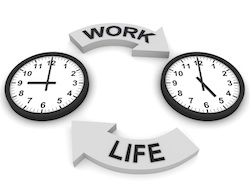By Janis Siegel ,
JTNews Columnist
Editor’s Note: This marks the debut of a new monthly column, “Israel: To Your Health,” which focuses on innovations in the health and medical fields from Israeli research and higher learning institutions.
It should come as no surprise to anyone in “the tribe” that we Jews put a high premium on work and success. Jewish achievement in the disciplines of science, law, medicine, academia, religion, and art are well known.
But do we pay a personal price for our devotion to hard work and excellence, or is it a core value that has contributed to our longevity as a religion and a culture?
Are we workaholics?
Mostly used as a social pejorative by family, unhappy spouses, and significant others who feel deprived of attention, some of us also heap the guilt on ourselves for “ignoring our loved ones,” which is a Jewish double-whammy that could bury a person in a pile of self-help books for days.
But it’s an unavoidable fact that the term itself, a close cousin to its precursor, the alcoholic, can’t be a good thing, right?
Coined in 1971by the now-deceased American professor of psychiatry and behavioral sciences Wayne Oates, a workaholic could be defined if his or her “need to work” took center stage in his life, endangered her health, or negatively impacted personal happiness, personal relationships, or social life.
Oates once said that the workaholic “drops out of the human community” in a quest to optimize personal achievement.
But, apparently, people who study such things say that there is really no one set of characteristics or personality traits that define someone as the “W” word.
In 1983, University of Texas researcher S.K. Mosier defined a workaholic as someone who simply worked 50 hours or more a week.
Others researchers have speculated that creativity and self-expression are also elements of the workaholic personality and that so-called workaholics enjoy “passionate involvement and gratification” through work. They found that workaholics continue to think about work even when they are not working.
In a 1997 study, Prof. Itzhak Harpaz, a leading researcher for the Israel Center for the Study of Organizations and Human Resource Management in the Graduate School of Management at University of Haifa, and his colleague Xuanning Fu at the University of California, found that expressive orientation was the strongest predictor of work satisfaction in Germany, Israel, Japan, and the United States.
In a 1998 international study that seemed to bolster this theory, Harpaz and several colleagues found that a majority of workers in seven countries would continue to work, even if it was not financially necessary.
The data showed that the American sample ranked second highest after Japan, followed by Israel, the Netherlands, and Belgium. The British and the West Germans ranked the lowest in what researchers termed “work centrality.”
Also in 1998, Harpaz studied the effects of religious convictions on labor force samples from Israel, the Netherlands, and Germany. While there was a strong association between work and religious convictions in the latter two, Harpaz found that in Israel, the more religious the worker, the weaker the connection to his or her job.
But the common element, wrote Harpaz in a 2009 paper, “Workaholism from a Cross-Cultural Perspective,” co-written with colleague Raphael Snir from The Academic College of Tel Aviv-Yaffo, is simply someone who puts “a substantial investment in work.”
“Some view it in positive terms, some equate it with other addictions, and some differentiate between positive and negative workaholic types,” wrote Harpaz.
Still others, he added, view it as only one kind of “heavy work investors,” and some say it’s mostly a “guy’s problem.”
In a 2003 study of two representative samples of the Israeli work force, “Workaholism, Its Definition and Nature,” Harpaz and Snir found that gender was the strongest predictor of workaholic behavior.
In general, men work longer hours than women do, and married men work more hours per week than unmarried men.
Conversely, they also found that unmarried women worked more hours per week than married women.
“In Israel, life is generally family centered, but women do double duty and often sacrifice pay and job for location, part-time work, and flex time,” noted Harpaz.
So, it seems that women in Israel, too, carry forward the everyday tasks of caring for home and family while working outside the home, and at the same time, often sacrifice wages and earning power, but that is another topic for another day.
For now, it might be time for a paradigm shift, a new label, a change in attitude.
Jews in Israel and in the United States don’t appear to be very different from others around the world — many of us like to work, consider our work an important part of our lives, and actually find it to be an expression of creativity. So, trade in that self-help tome and accept some kudos for your toil.
